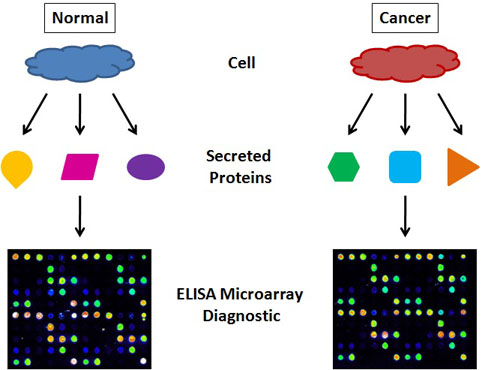'Fingerprinting' Breast Cancer Cells

The technique developed by Servoss’ research team will determine a profile – a protein fingerprint – that indicates breast cancer.
FAYETTEVILLE, Ark. – Researchers at the University of Arkansas are building a library of synthetically produced antibodies that can detect and rapidly validate proteins secreted by breast cancer cells. Their work will accelerate the process of developing a simple blood test for early detection of breast cancer.
“We want to implement a rapid screen that is sensitive – meaning highly accurate – non-invasive and inexpensive,” said Shannon Servoss, assistant professor of chemical engineering. “Such a test would be easy to use – as easy as a pregnancy test – and applicable to women of all ages, races and ethnicities. The ultimate goal, of course, is early detection of breast cancer.”
Researchers currently use specific protein binders called affinity reagents, which are molecules that interact with proteins, to recognize and validate proteins that indicate breast cancer. But this process is tedious and problematic because there are a limited number of affinity reagents available, and techniques to develop them are slow and expensive.
 |
Servoss’s team seeks to overcome these obstacles by developing a collection of affitoids, which are synthetic, peptoid-based affinity reagents. A library of these affitoids, which are inexpensive and easy to make, will facilitate the development of techniques for protein validation.
The affitoids have other advantages. They can be designed to have desired properties, such as structural stability and specificity for a single protein. They also do not have to be limited to breast cancer detection. They could be designed to detect other complex diseases.
“This technique is superior to those currently available because affitoids specific for proteins secreted by breast cancer cells can be rapidly selected from a large collection, which isn’t too expensive to build,” Servoss said. “The selected affitoids will be used to determine a profile – a protein fingerprint – that indicates breast cancer. Of course, all of this is happening at the cell level, before the tumor is detectable.”
According to the Centers for Disease Control and Prevention, each year more than 40,000 women die due to breast cancer, and approximately 200,000 women are diagnosed with the disease. Early diagnosis leads to decreased mortality rates and allows for many more treatment options.
“It is imaginable that in this generation, a simple blood test could detect breast cancer at early stages and save thousands of lives,” Servoss said.
Contacts
Shannon Servoss, assistant professor, chemical engineering
College of Engineering
479-575-4502,
sservoss@uark.edu
Matt McGowan, science and research communications officer
University Relations
479-575-4246,
dmcgowa@uark.edu
Headlines
Four Students Named Goldwater Scholars; Two Earn Udall Honorable Mentions
Four U of A students have received the prestigious Goldwater Scholarship, an award for top students in mathematics, science, and engineering.
Cross-Campus Collaboration Culminates in New Outdoor Geological Installation
Grand opening event to celebrate the new GeoLab installation at the U of A’s Gearhart Hall courtyard is set for May 3. The installation will be open to the public year-round.
First Students to Use Online Degree to Hone Nursing Leadership, Elevate Patient Care
Hanna Baxendale and Wendi Kimbrell will begin coursework in the Doctor of Nursing Practice-Executive Master of Business Administration program offered by the Eleanor Mann School of Nursing and Walton College.
Join the Office for Sustainability on a Final Cruise to Campus
Cruise to Campus Wednesdays have fostered a gathering space for individuals interested in biking to campus. Drop by the Old Main Lawn from 7:30-10 a.m. Wednesday for coffee, something to eat and conversation.
Fay Jones School Student Ambassador Program Gives Voice to Design Students
The student ambassador program at the Fay Jones School of Architecture and Design is built to connect top design students with their school, its alumni, its future students and others inside and outside the school.




